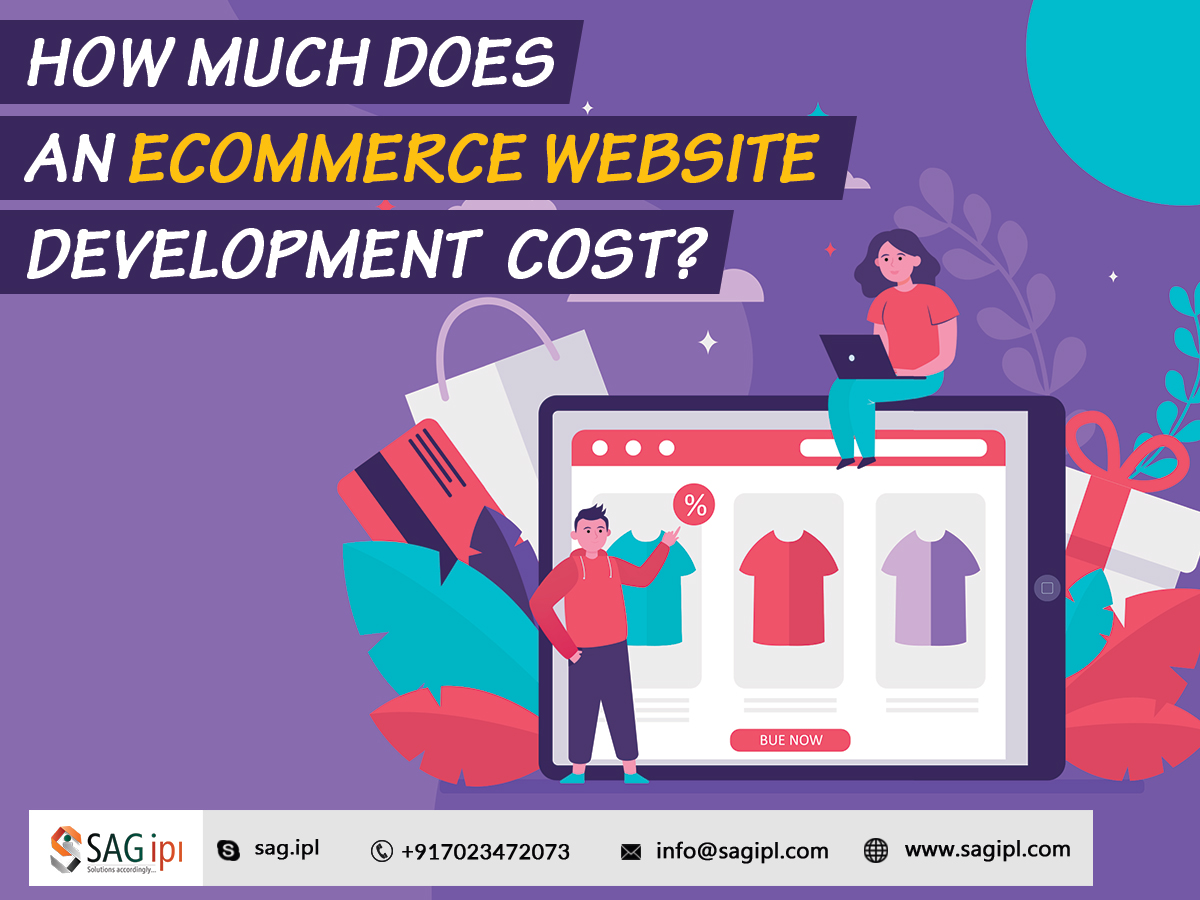To make your e-commerce business excel in the dense competition, choosing the right platform to host your online store should be your prime decision. With many options available, Shopify and WooCommerce are the most popular e-commerce platforms with a fair share of total e-commerce websites. Each platform offers unique advantages and disadvantages, deciding which is the best for your online store, Shopify or WooCommerce, poses challenges for entrepreneurs and businesses.
As we delve into this Shopify VS WooCommerce comparison, we’ll go through some key factors such as ease of use, customization capabilities, designs and themes, costs, security, and overall performance. Stick to the blog till the end as we guide you in choosing the best host for your online store.
Shopify VS WooCommerce: Know the Fundamentals
Both platforms allow you to make your e-commerce website feature-rich without needing much technical knowledge or coding skills. WooCommerce is a WordPress plugin, and Shopify operates as an independent platform without requiring WordPress. With both of them, you need to purchase your domain and hosting plans. Let’s understand the basic aspects of both platforms.
What Is WooCommerce?

WooCommerce is an open-source WordPress plugin used after integrating it with the WordPress setup. It doesn’t stand alone as an independent e-commerce platform. Introduced in 2011, WooCommerce swiftly gained traction within the e-commerce sphere, emerging as the favoured e-commerce solution, adopted by over 6.2 million users. Its popularity lies in its user-friendly interface, robust feature set, and extensive customization capabilities. The most important fact is that WordPress is the globally acclaimed content management system (CMS), to operate your online store.
What Is Shopify?

Shopify isn’t open-source but provides several salient features to streamline many operations of an e-commerce store. Shopify has a monthly subscription fee and takes a commission on each sale. Nonetheless, Shopify simplifies the process for beginners to build an online store, even without coding proficiency. However, customization might necessitate professional assistance.
Salient Features of Both the E-commerce Platforms
Shopify
Shopify is an all-in-one solution that helps you to create an online store, manage your products, and handle payments using a single service and it:
- Offers three different plans, starting at $29 per month.
- Offers a free myshopify.com subdomain for all plans.
- Enables you to add unlimited products to your store.
- Charges specific fees for all your payments.
- Offers its own app shop free and paid- which allows you to extend the functionality of your store.
- Offers dozens of premium themes to customize the look of your online store.
- Provides a Secure Socket Layer (SSL) certificate alongside all its plans.
- Provides its own analytics system that can also be integrated with Google Analytics.
- 27/7 support.
WooCommerce
WooCommerce is an open-source e-commerce platform that has been built for WordPress websites, which is a Content Management System (CMS), and allows you to modify your online store as you want. Its features are tailored for e-commerce businesses. It-
- Offers completely free plans, but you will need to purchase your own hosting and domain.
- Offers support for an unlimited number of products.
- Payment fees depend on the payment processors you decide to add.
- Has an extension system (same as WordPress plugins) that provides additional functionality to your online store. Extensions are available in both free and premium versions.
- Allows WooCommerce developers to offer support through a help desk for their users, as well as extensive documentation for the software. WooCommerce is a popular and powerful e-commerce platform that allows you to create and manage your online stores with ease. Whether you need a simple or complex website, WooCommerce development services can help you achieve your goals.
- Offers endless premium and free themes for WooCommerce.
- Provides SSL support.
- Can be integrated with Google Analytics through the plugin.
Comprehensive Comparison Between WooCommerce vs Shopify
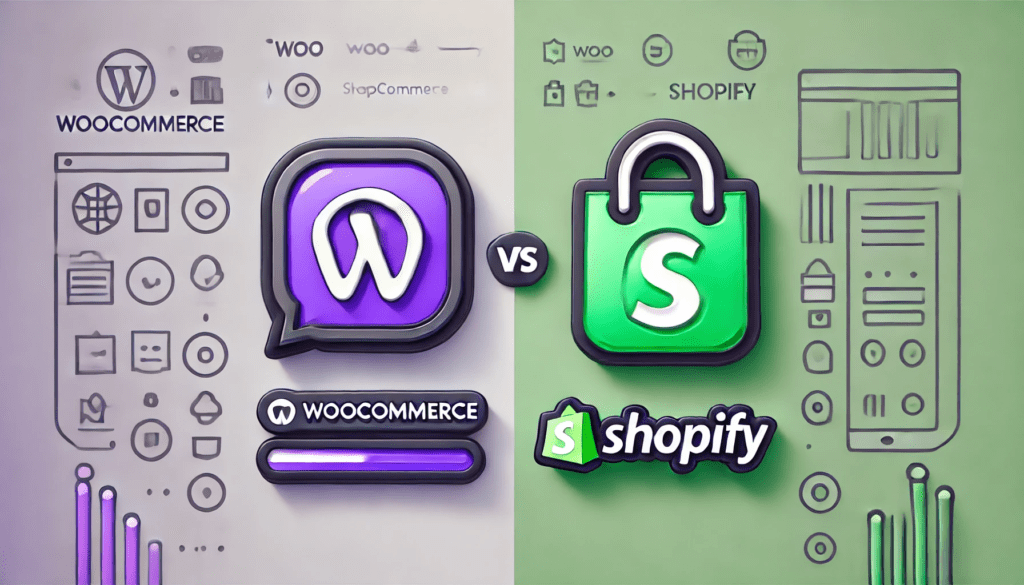
Free Trials
You are lucky because both e-commerce platforms have free trials to let you try before paying. Free trials provided by any platform allow you to explore the product without worrying about paying for unwanted things. Although Shopify offers a free trial only for three days, it has another option for you which is to buy it for only and only $1 for the first month.
WooCommerce also comes with a similar trick to attract you to adopt its e-commerce platform. It gives you a free 14-day trial period and to continue the premium features, you can also get it for $1 for the first three months. It gives you enough time to explore its various features and functionalities like premium themes, SEO tools, customization, options, and its support system.
Set Up and Ease of Use
If you plan to set up your online store quickly and start operations immediately, Shopify performs as you want it to. The setup process for Shopify is easy and fast, whether it’s listing your first product or choosing the right template.
Specifically, this e-commerce platform is known for handling large-scale stores. It offers an intuitive process with the functionality to edit items, create variants, or even upload products in bulk using CSV. After uploading your products, it simplifies the process of integrating sections through templates. Shopify has introduced new and enhanced image generators and writing tools powered by AI to its platform.
WooCommerce has a different setup. Generally, programmers and designers prefer WooCommerce, which can make it somewhat challenging for average business owners to use effectively. Its dashboard is easy to navigate when adding products, but challenges arise during the integration process because it is not subscription-based.
These challenges include purchasing a domain and hosting, installing WordPress, and managing WordPress properly. This can only be handled by WordPress developers who are familiar with every aspect of WordPress, including plugin setups.
Website Design and Themes

When you create a Shopify account, you instantly gain access to more than 70 free themes, along with some premium options. These themes are well-crafted and can be easily integrated into your online store. However, it may put you in confused with various design features available.
You can purchase a theme from the Shopify store, this typically involves a one-time payment.
WooCommerce provides a vast selection of hundreds of themes that are designed to be automatically mobile-responsive. However, ensuring that your website’s design is straightforward and user-friendly may require more time, as each plugin comes with its own distinct user experience (UX) to master.
If you’re aiming for a more tailored layout for your e-commerce site, opting for WooCommerce is advisable, but be prepared to dedicate both time and financial resources to the development process.
Costs
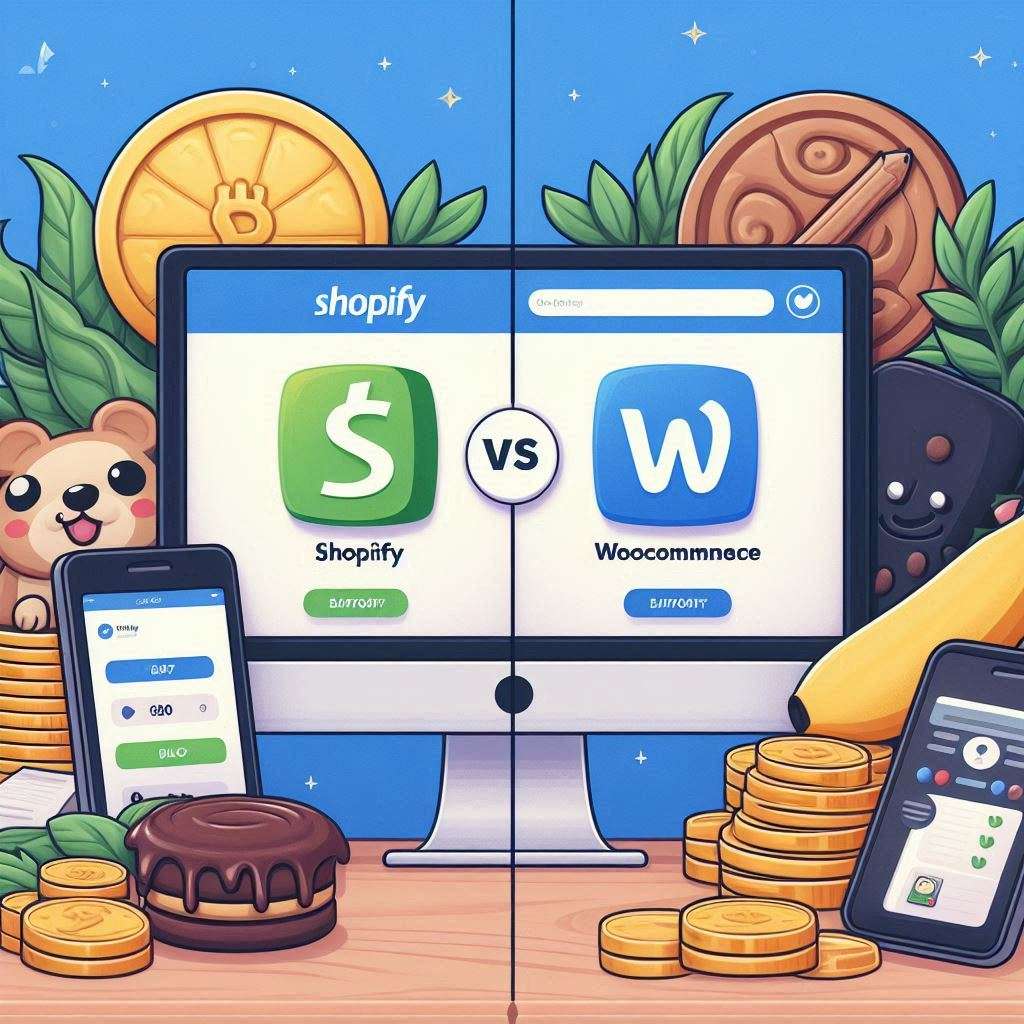
Shopify allows users to start with a free trial for several days, enabling them to explore building their e-commerce site. After this initial period, users are allowed to use the platform for the first month at $1.
Shopify offers a 3-day free trial after which users must choose a subscription plan to continue with the platform.
| Shopify Plan | Monthly Cost | Annual Cost (Per Month) | SSL Certificate | Web Hosting |
|---|
| Basic | $39 | $29 | Included | Included |
| Shopify | $105 | $79 | Included | Included |
| Advanced | $399 | $299 | Included | Included |
| Shopify Plus | ~$2,000 | N/A | Included | Included |
Each plan includes the number of users per account product listings storage space, and many other functionalities.
WooCommerce starts with a free service but requires payment for additional services such as domain registration, SSL certification, and a WordPress website hosting plan. The costs for these services can differ significantly. A single domain registration may cost you at least $15. Hosting starts at $3.99 per month and can go as high as $5,000. You can also get discounts depending on the particular hosting service provider.
As WooCommerce is just a plugin for your WordPress website, you may need to install several other plugins for different functions you want on your online store. While some plugins may come free of cost, for some of them you may have to purchase the plan.
With such diverse cost factors at play, choosing the best platform often hinges more on desired features than on pricing alone.
Support

Both platforms provide some level of user support. However, Shopify stands out by ensuring that user inquiries are addressed efficiently. Their customer service team is available 24/7 and can offer concrete solutions.
On the other hand, WooCommerce operates on an open platform that allows anyone to add integrations. This openness can make it challenging for their support team to address every issue raised by users. Nevertheless, if you are using WooCommerce effectively, you might find that you rarely need assistance. But still support from the side of the platform is always expected.
SEO Optimization on Both Platforms
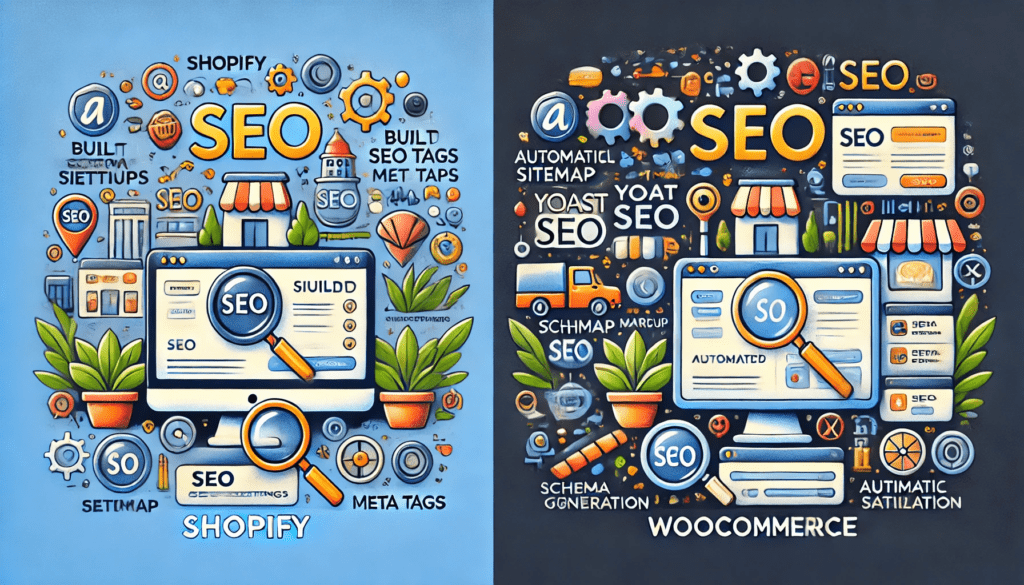
To ensure your online store ranks for popular searches, including product-related keywords on Google, it’s essential to focus on SEO. Various factors contribute to SEO, but your chosen platform should facilitate the implementation of effective e-commerce SEO strategies.
Shopify includes a built-in SEO plugin and supports essential SEO practices such as managing meta information and site content. Shopify-backed online stores generally load faster, which can enhance your site’s visibility in Google search results.
WooCommerce, being integrated with WordPress, allows extensive customization of body content, URLs, meta descriptions, alt tags, and other on-page elements through powerful SEO tools. This makes WooCommerce a preferable choice for those aiming for higher Google rankings.
Dropshipping Features
When launching an e-commerce business, you need to make sure that customers receive their orders on time. This requires integrating delivery services into your website. Shopify partners with several well-known vendors for product delivery, though costs may vary based on their monthly fees or one-time charges. However, your options are confined to Shopify’s plugins.
WooCommerce offers a broader selection of delivery options, allowing you to choose according to your needs. For instance, if you’re a small business with limited deliveries each month, you might prefer a per-item delivery service instead of a subscription model.
Most Secured Platform
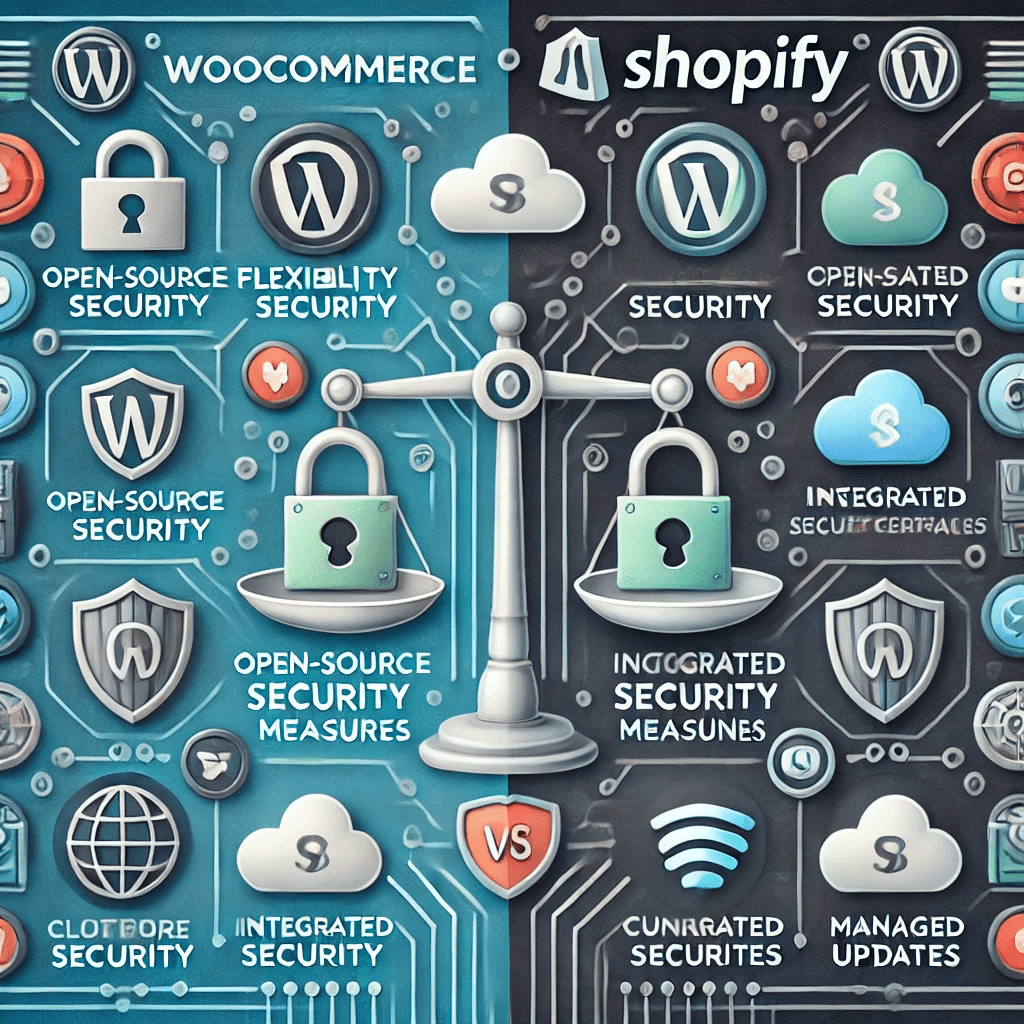
Security is the biggest concern when online frauds are present in the ecosystem, it may harm your brand’s popularity. Shopify is PCI-compliant and provides a reasonable level of security. Typically, Shopify stores offer users a secure browsing experience. However, you will have limited options and must rely on the platform for ongoing security updates.
Additionally, since Shopify is not self-hosted, you cannot enhance your store’s security through custom hosting solutions.
WooCommerce offers greater control over security features. With WooCommerce, you can implement stringent security measures tailored to your needs through various hosting options.
Choosing Between WooCommerce vs Shopify in 2024: Which Is the Ideal Selection for You?
After thoroughly detailing the functionalities with an aspect of comparison of both e-commerce platforms in the WooCommerce vs. Shopify debate, it’s now time to choose the platform that aligns best with your requirements.
As highlighted earlier, Shopify is the preferred choice for users seeking a streamlined website and online store setup process, coupled with premium support. While this service ensures a hassle-free experience, it does come with a monthly subscription fee. Consequently, Shopify can be an ideal choice for businesses lacking extensive technical expertise, as the platform manages all technical aspects, including SEO, albeit at an additional cost.
On the other hand, WooCommerce boasts popularity due to its inherent flexibility. Nevertheless, its setup can be more intricate, necessitating a certain level of technical, WordPress, and e-commerce SEO knowledge. WooCommerce can be the best choice for individuals who are well-versed in HTML and technical skills. Being an open-source software it allows for comprehensive customization of every facet of an online store.
Both Shopify and WooCommerce stand as prominent e-commerce development platforms in their own right, each accompanied by its unique set of pros and cons.
Therefore, the decision remains yours, based on your business requisites, and opt for the platform that most aptly serves your needs and matches your expertise level.
WooCommerce vs. Shopify Conclusion
If you desire an all-in-one solution that allows for quick setup and offers numerous user-friendly features and applications, Shopify is the ideal choice for your business. Additionally, it boasts excellent customer support and various integration options.
On the other hand, if you already have a WordPress site or plan to create one and wish to maintain greater control over your online store’s design and functionality while dedicating time to detail-oriented tasks, WooCommerce is the better option. It provides enhanced adaptability and superior SEO capabilities while allowing for significant scalability.
FAQs for Shopify vs WooCommerce
What Is an E-Commerce Platform?
An e-commerce platform is a software solution that makes the buying and selling of goods and services over the internet from a single platform. It serves as the backbone for most online retail businesses, managing various operations, including product listings, payments and customer interactions.
Is It Worth Hosting Your Online Store on an E-Commerce Platform?
Hosting your online store on an e-commerce platform is worth it due to its convenience, scalability, and cost-effectiveness. These platforms provide essential tools for managing sales, inventory, and customer interactions while offering 24/7 accessibility. This setup allows your store to reach a global audience increasing customer experiences efficiently.
How do the costs compare between Shopify and WooCommerce?
WooCommerce is free to use initially, but its costs can increase due to hosting, other premium plugins, and integrating additional security measures. Shopify’s total cost of ownership (TCO) is often lower because it includes many features in its pricing structure, resulting in a more predictable cost model.
Which Platform Has the Better Customization Options?
WooCommerce offers greater flexibility and customization capabilities because it operates within the WordPress ecosystem, allowing access to thousands of plugins and themes. Shopify provides a user-friendly interface with pre-designed templates but has limitations on deep customization without coding knowledge.
Which platform offers better customer support?
Shopify excels in customer support with 24/7 assistance via phone, live chat, and email. With WooCommerce, you may have to rely more on community forums and support documentation, which is not good for immediate help.
Which platform is better for SEO?
Both platforms have strong SEO capabilities. But WooCommerce excels in this one more step giving customization of SEO strategies. Shopify offers a solid foundation for SEO but may have limitations in terms of deep customization compared to WooCommerce.
Who should choose Shopify over WooCommerce?
Shopify is ideal for businesses that prioritize ease of use, quick setup, and comprehensive support without needing extensive technical knowledge. It’s particularly suited for larger stores due to its robust features and scalability.
Who should choose WooCommerce over Shopify?
WooCommerce is better suited for users who desire full control over their store’s design and functionality or those who already have a WordPress site. Businesses requiring extensive customization options without much technical knowledge, better go with WooCommerce.
Can I migrate from one platform to another easily?
Yes, certainly. Migrating from WooCommerce to Shopify can be straightforward due to Shopify’s user-friendly interface designed for easy product uploads and management. However, moving from Shopify to WooCommerce may require more technical expertise due to the complexities involved in setting up WordPress hosting and plugins.

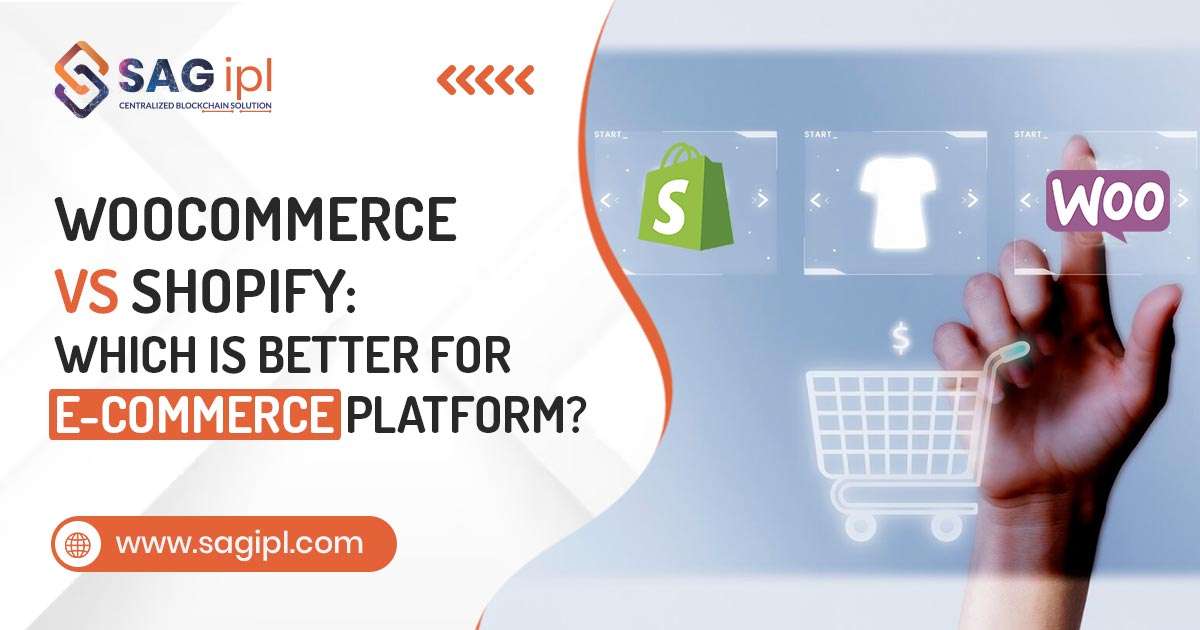
![Most Popular eCommerce Platforms for Online Business [2024] Most Popular eCommerce Platforms](https://blog.sagipl.com/wp-content/uploads/2023/06/Most-Popular-eCommerce-Platforms-250x150.jpg)

![What Are the Different Types of Web Development? [2024] Different Types of Web Development](https://blog.sagipl.com/wp-content/uploads/2024/02/Different-Types-of-Web-Development-250x150.jpg)
